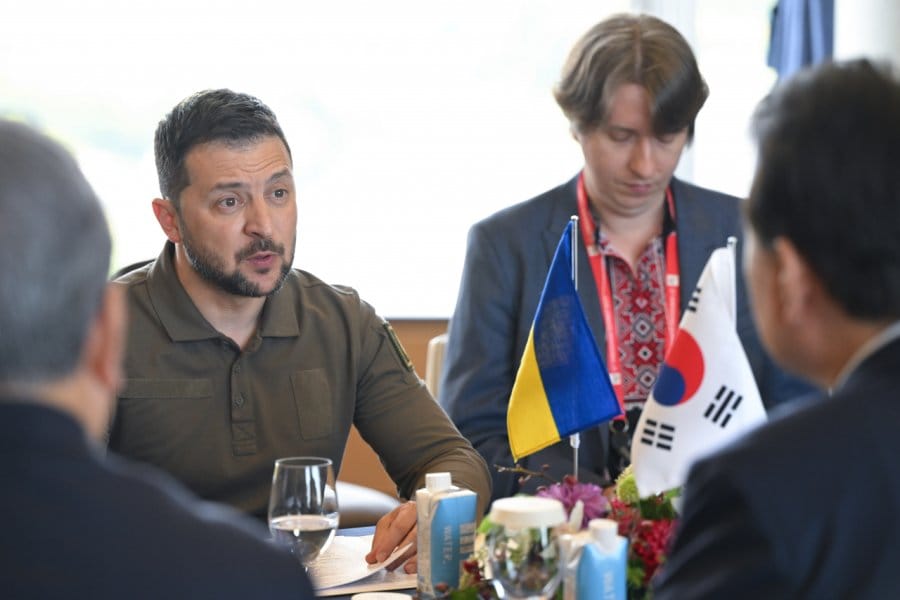May 22, 2023
SEOUL – South Korean President Yoon Suk Yeol pledged to continue providing non-lethal aid for Ukraine upon the request of Ukrainian President Volodymyr Zelenskyy in their first meeting held in Hiroshima, Japan, on the sidelines of an expanded Group of Seven summit session on Sunday.
Yoon told Zelenskyy that Seoul will push for sustained diplomatic, economic and humanitarian aid for Ukraine, with medical evacuation vehicles and demining vehicles being the primary focus as of the current moment, Yoon’s spokesperson said in a statement Sunday.
Korea has provided humanitarian aid such as medicines, power generators and computers for educational purposes, the spokesperson added.
Korea will remain supportive of the Ukrainian people “until (Ukrainians) regain peace and live in normal lives” without war, Yoon was quoted as saying by the spokesperson. Yoon told Zelenskyy that Korean companies will participate in postwar reconstruction projects, but did not mention Seoul’s support of lethal aid to Ukraine.
This comes about a month after Yoon hinted at shifting his stance against supplying arms to Ukraine in an interview with Reuters on April 19 and another with NBC on April 25, should the Kremlin commit “large-scale attack on civilians, massacre or serious violation of the laws of war.”
However, Yoon said on Sunday that any attempts to change the status quo by force constitute a severe breach or international rules, and such violations are happening both in Ukraine and North Korea.
Zelenskyy tweeted that he “thanked (Korea) for the humanitarian and non-lethal assistance to Ukraine in particular, for demining vehicles” during the summit.
He added that he had “briefed (Yoon) on the situation at the front and how Ukraine is repelling full-scale aggression of Russia.”
The two leaders talked for 32 minutes, according to Yoon’s office.

This photo shows Ukrainian President Volodymyr Zelenskyy (left) speaking during a summit with South Korean President Yoon Suk Yeol on Sunday in Hiroshima, Japan. (Yonhap, provided by Joint Press Corps)
The meeting was arranged upon Ukraine’s request, Yoon’s spokesperson said Sunday. Seoul’s response to Zelenskyy’s proposal — potentially humanitarian as well as military aid to Ukraine — will be made “based on our own principle and merit,” the spokesperson added.
The presidents were meeting for the first time since the two countries since Russia’s invasion of Ukraine in February 2022. Yoon was elected in March that year.
Prior to meeting with Yoon, Zelenskyy spoke with Indonesian President Joko Widodo and Canadian Prime Minister Justin Trudeau on Sunday on the sidelines of the G-7 summit, according to his Twitter account.
The Ukrainian leader made a surprise in-person appearance at the city over 670 kilometers west of Tokyo on Saturday via a French airplane, as he was expected to appear only virtually.
He landed just after the G-7 leaders issued a statement denouncing Russia for its invasion of Ukraine. Yoon also met with his Indian counterpart Narendra Modi and French President Emmanuel Macron, among others.
Zelenskyy announced that he attended the G-7 summit to “attract as many countries and leaders as possible for the sake of Ukraine” to strengthen its defense, long-term support programs, finance and economy as part of the war-torn country’s “Peace Formula.”
“There have been attempts to ignore and disregard what we value,” Zelenskyy noted on his Twitter account Sunday, calling for G-7 member nations’ concerted efforts to ward off Russia’s invasion of Ukraine.
“Anyone who might want to wage aggression against a democratic country sees what the response will be. … Democracy needs more. I think we need the clear global leadership of democracy.”
Also on Saturday, Zelenskyy on Twitter hailed the US’ decision to provide joint F-16 fighter jet training for Ukrainian pilots.

This photo shows South Korean President Yoon Suk Yeol (right) shaking hands with Ukrainian President Volodymyr Zelenskyy during a summit on Sunday in Hiroshima, Japan. (Yonhap, provided by Joint Press Corps)
Earlier this week, Yoon met Zelenskyy’s wife, first lady Olena Zelenska, in Seoul.
On Tuesday, Zelenska asked for Seoul’s support within its capacity, telling Yoon that she understands the country’s challenges in providing lethal weapons, according to Yoon’s office.
Seoul has long insisted that it would only provide humanitarian aid to Ukraine, effectively rejecting Kyiv requests for lethal weapons.
The G-7 summit was attended by Japan, the United States, the United Kingdom, France, Germany, Canada and Italy, as well as the European Union. This year’s expanded session invited leaders of eight nonmember countries, including South Korea, Australia and Vietnam.


